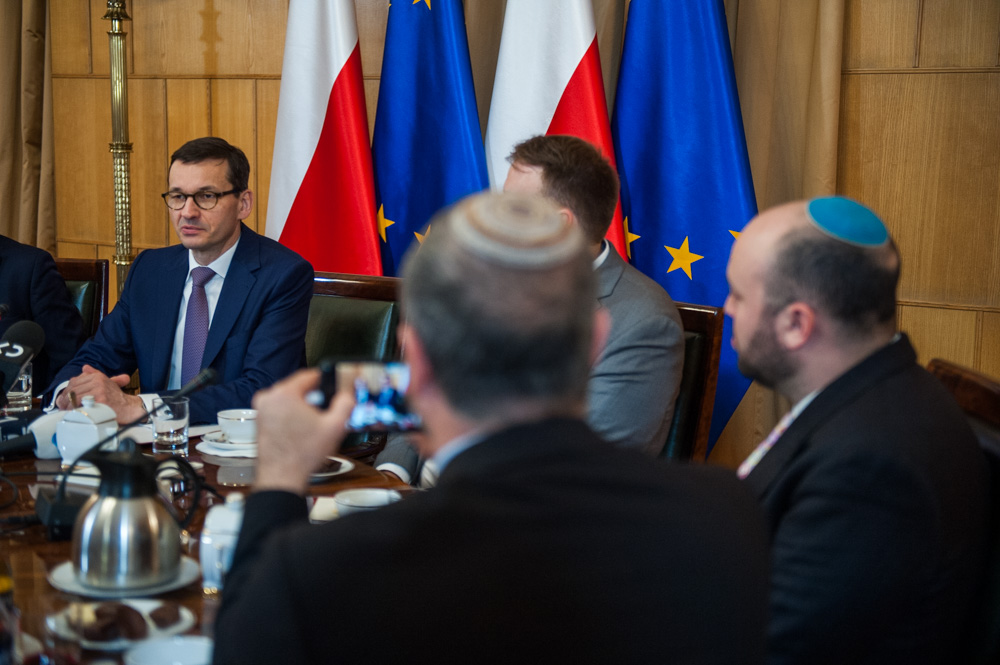Israel’s foreign minister has accused the Polish prime minister of making an “antisemitic allusion” by suggesting that a dispute over Jewish property restitution is only about money. Poland’s deputy foreign minister has in turn claimed that “anti-Polish attitudes” are common in Israel.
The exchange marked a further escalation in a dispute over a proposed new law in Poland that would limit historical restitution claims. The row saw both governments summon one another’s ambassadors for talks over the weekend.
On Friday, Israeli foreign minister Yaid Lapid condemned the legislation as “immoral”, saying that it would prevent Jewish Holocaust survivors and their descendants from reclaiming stolen property. The Polish foreign ministry accused him of “ill will” and a “complete lack of knowledge”.
When asked for a response to Lapid’s comments, the head of Poland’s government, Mateusz Morawiecki, said, “as long as I am the prime minister, Poland will certainly not pay for German crimes; not a zloty, euro, or dollar”.
Lapid then hit back, tweeting yesterday that “we are not interested in Polish money and the allusion itself is antisemitic. We are fighting for the memory of the victims of the Holocaust, for the pride of our nation, and no parliament can pass laws aimed at denying the Holocaust”, reports Onet.
On Sunday morning, Poland’s foreign ministry summoned the acting head of the Israeli embassy in Warsaw, Tal Ben-Ari Yaalon, for talks on Monday. Later that day, Israel’s foreign ministry also summoned Polish ambassador Marek Magierowski.
"Not a single zloty, euro or dollar". Could #Poland’s response be more antisemitic? https://t.co/j1X99bi46O
— Arsen Ostrovsky (@Ostrov_A) June 27, 2021
Polish officials this morning told Ben-Ari Yaalon that they were “disappointed” with Lapid’s “inappropriate” remarks, which “hurt relations between the countries”, according to Amichai Stein, diplomatic correspondent for Israel’s public broadcaster.
“We are ready for a discourse that will be based on mutual respect, and on the basis that we will not allow intervention in local law,” the officials told the Polish diplomat. “Poland trusts the Israeli side to base its claims on facts and not accusations.”
Speaking afterwards, Polish deputy foreign minister Paweł Jabłoński said that “the position of the Israeli side remains unchanged” and claimed that it was motivated by “domestic politics over international relations”.
Polish offivials added: "We are ready for a discourse that will be based on mutual respect, and on the basis that we will not allow intervention in local law – Poland trusts the Israeli side to base its claims on facts and not accusations."
— Amichai Stein (@AmichaiStein1) June 28, 2021
“We must be aware that the political discourse in Israel is dominated by attitudes that are either critical of Poland or even directly anti-Polish,” added Jabłoński, in quotes carried by RMF24. “Many politicians in Israel believe it is profitable for them to fuel the dispute with Poland, because thanks to this they can gain greater support.”
The deputy minister said that Poland would nevertheless continue to explain the reasons for introducing the legislation in question, which stems from a Constitutional Tribunal ruling and has received backing from opposition parties as well as the ruling coalition.
Among those who lent support to the Polish position was the son of recently ousted Israeli prime minister Benjamin Netanyahu. The Israeli government has created an “artificial crisis” with Poland and it “does not represent the people of Israel”, said Yair Netanyahu, quoted by Onet.
People of Poland- please know that the current government in Israel is illegitimate and does not represent the people of israel! It is made up of petty politicians who broke all their promises to their voters, and of the party of the Muslim brotherhood.
— Yair Netanyahu 🇮🇱 (@YairNetanyahu) June 25, 2021
The amendment in question does not explicitly or exclusively apply to restitution for Holocaust survivors. Rather, it would introduce a 30-year limit for making claims against administrative decisions that were in violation of the law. This would block many claims relating to property seized during World War Two or the postwar communist era.
The legislation was approved overwhelmingly in the lower house of Poland’s parliament, the Sejm, last week. It has now passed to the upper-house Senate, where the opposition have a majority.
On Friday, the spokesman for Civic Platform (PO), the largest opposition group, said that his party, which abstained from the vote in the Sejm, would seek to “fix” the legislation in the Senate. This would include ensuring that it does not invalidate any pending legal proceedings.
Among those to join the criticism of Poland over the weekend was Ronald S. Lauder, president of the World Jewish Congress.
“This law is a slap in the face to what remains of Polish Jewry and survivors of Nazi brutality everywhere,” said Lauder. “It also sets a terrible precedent throughout Europe as survivors and descendants continue to seek justice.”
“It pains me to say this, but I think that the time has come for the international Jewish community to re-evaluate our relationship with a government that is behaving with unimaginable callousness and is emulating the worst traditions in Polish history rather than the best and most uplifting ones,” he continued.
“Since moral persuasion clearly has not been effective, perhaps the time has come to treat Poland with the same consideration it accords to Polish Jews and their descendants seeking justice,” concluded Lauder.
A terrible precedent for Europe. WJC President Ronald S. Lauder strongly condemns Polish draft law blocking restitution to Nazi victims
READ: https://t.co/NRchUiYmrv pic.twitter.com/tfxud9iOej
— WJC (@WorldJewishCong) June 27, 2021
Main image credit: W. Kompała / KPRM (under public domain)

Daniel Tilles is editor-in-chief of Notes from Poland. He has written on Polish affairs for a wide range of publications, including Foreign Policy, POLITICO Europe, EUobserver and Dziennik Gazeta Prawna.




















